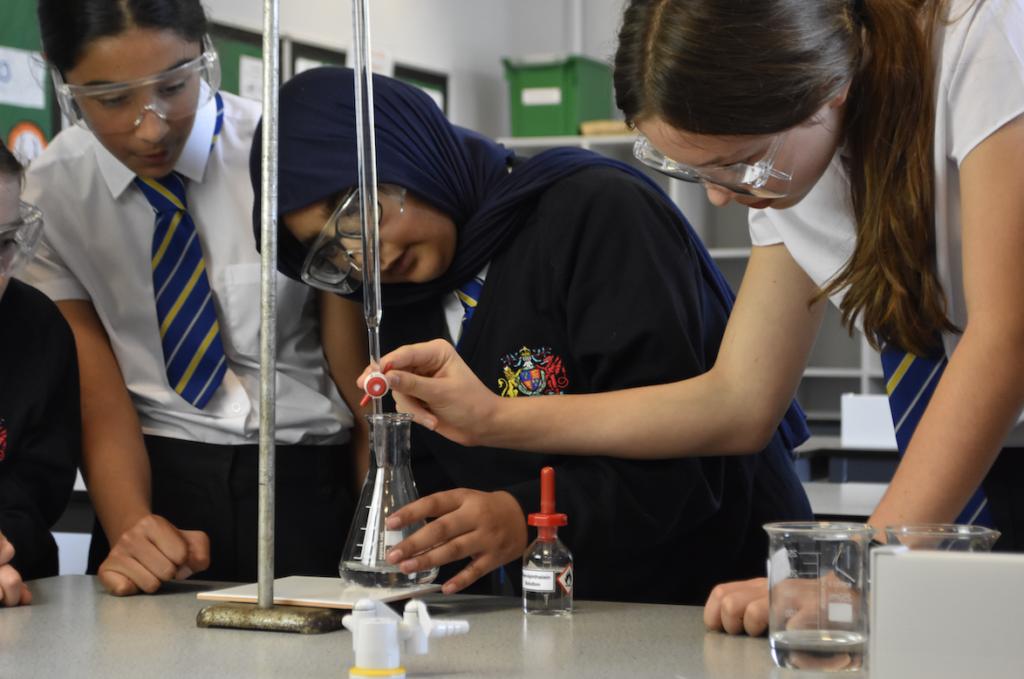Year 7, 8 and 9 explore the content specified by the National Curriculum for Key Stage 3 Mathematics. The curriculum is designed to challenge and stretch students and builds upon their knowledge and application.
The Key Stage 3 scheme of work is organised into distinct topics to allow students to develop mathematical fluency in all areas of maths, but teaching will make connections between these topics to aid the development of mathematical reasoning and problem solving. The sequencing of the topics follows a sensible and logical order to ensure that students have the prerequisite skills to build upon prior knowledge at each stage of their learning. The prerequisite skills and connected topics will be referred to by teachers, and shared with students, at all opportunities.
The learning outcomes in each unit are identified as declarative, procedural or disciplinary to highlight to students and teachers how knowledge develops within each unit of work, aiming to minimise cognitive overload. All declarative learning outcomes could be prefixed with ‘All students must know…..’, procedural outcomes could start with ‘Students must be able to….’ and disciplinary outcomes with ‘Students must know when to….’.
The schemes of work are designed as a five-year continuum and therefore sufficient time is given to each topic to allow for depth of teaching. The expectation is that the majority of students will move through the scheme of work at broadly the same pace – students who grasp concepts rapidly will be challenged through being offered increasingly sophisticated problems before moving on to new content; challenge is provided through depth rather than acceleration. Those who are not sufficiently fluent with earlier material will consolidate their understanding, including through deliberate practice, before moving on.
Upon entry into Year 7, some students may not be fully prepared to engage with the main scheme of work. Through careful analysis of SATS data and our own baseline assessments, we identify pupils who would benefit from a tailored ‘transition scheme of work.’
This alternative pathway is designed to reinforce foundational skills from primary education, with a strong emphasis on retrieval practice and consolidation of key concepts. The transition scheme gradually integrates elements of the main curriculum, aiming for full alignment by the Easter term.
In exceptional cases, where students continue to face significant barriers to accessing the curriculum, we provide bespoke individualised learning plans to ensure their educational needs are met.
Year 7
Autumn Term
Number Skills
An introduction to different types of numbers and the development of mental and written methods of arithmetic.
Analysing and Displaying Data
An introduction to the different averages and the visual representation of data.
Expressions and Formulae
An introduction to algebraic notation, manipulation and substitution.
Spring Term
Angles and Lines
An introduction to the common angle facts and how these can be used to solve geometric problems.
Decimals and Measures
Students will develop their rounding skills and their ability to calculate with decimals and measures.
Fractions
Students will develop their ability to calculate with fractions.
Summer Term
Proportional Reasoning
Students will use ratio notation to solve problems.
Percentages
Students will develop their ability to calculate with percentages, including percentage increase / decrease and percentage change.
Probability
An introduction to the language of probability and how to calculate the probability of events.
Real Life Graphs
Students will explore how real life events can be represented visually.
Year 8
Autumn Term
Number Skills
Students will develop their arithmetic skills through solving increasingly complex problems.
Working with Powers
Students will be introduced to the laws of indices and the concept of standard form.
Fractions, Decimals and Percentages
Students will work interchangeably with fractions, decimals and percentages.
Spring Term
Equations and inequalities
Students will extend their algebraic knowledge through setting up and solving equations and inequalities.
Probability
Students will extend their probability knowledge from year 7, focussing on the visual representation of probability, in order to solve problems.
Functions and Graphs
An introduction to the graphical representation of algebraic functions, building on their knowledge of graphs from year 7.
Summer Term
Formulae and Compound Measures
Students will use their algebraic knowledge from year 7 in order to construct and use formulae.
2D Shapes and 3D Solids
Students will develop their knowledge and vocabulary of shapes, both 2D and 3D.
Ratio and Scale
Students will apply their knowledge of ratio to differing contexts, including maps and scale drawings.
Transformations
An introduction to the 4 key transformations: translation, rotation, reflection and enlargement.
Year 9
Autumn Term
Number Skills – Accuracy and Measures
Students will use their knowledge of rounding to estimate and work with bounds.
Powers, Roots and Standard Form
Students will use their knowledge from year 8 to calculate with standard form. Surds will be gradually introduced at this stage.
Analysing Data
Students will develop their analytical skills through working with the averages in large data sets.
Polygons and Angles
Students will extend their geometric reasoning from year 8, through solving increasingly complex problems involving 2D shapes and angles.
Spring Term
Circles
Students will apply their knowledge of formulae to solve problems involving the circumference and area of circles and part circles.
Fractions and Percentages
Students will apply their knowledge of fractions to increasingly sophisticated problems and will be introduced to the concept of growth and decay.
Pythagoras
Students will be introduced to Pythagoras’ Theorem, which they will use to solve geometric problems.
Trigonometry
Students will build on their knowledge of ratio through the investigation and application of the trigonometric ratios in right angled triangles.
Summer Term
Expressions and Quadratics
Students will combine all of their knowledge of algebra from years 7 and 8 in order to explore quadratic equations.
Ratio and Proportion
Students will combine their knowledge of proportion with their algebraic manipulation skills, in order to investigate direct and indirect proportion.
Transformations
Students will develop their geometric manipulation skills through learning to combine transformations.
Assessment at Key stage 3
- Homework activities, both online and written, which are designed to consolidate content from within the classroom and allow for early identification of areas of concern.
- In-class low stakes topic tests after every unit.
- Half termly summative assessments, with key intervention topics included.
- End of year summative assessments, covering all content from throughout the year.
How can parents help support their child’s learning?
- Visit maths club on a Monday, Tuesday, Thursday and Friday lunchtime.
- Use the ‘MyProgress’ section of MathsWatch.
- Visit the learning base to ask for additional support with homework.
- Visit the ‘Maths – Online Curriculum (years 7 to 10)’ Google Classroom, which provides an overview of the programme of study, with worksheets and video links for each topic.
Enrichment opportunities
Regular participation in the UK Mathematics Trust Junior Maths Challenge.
![]()


